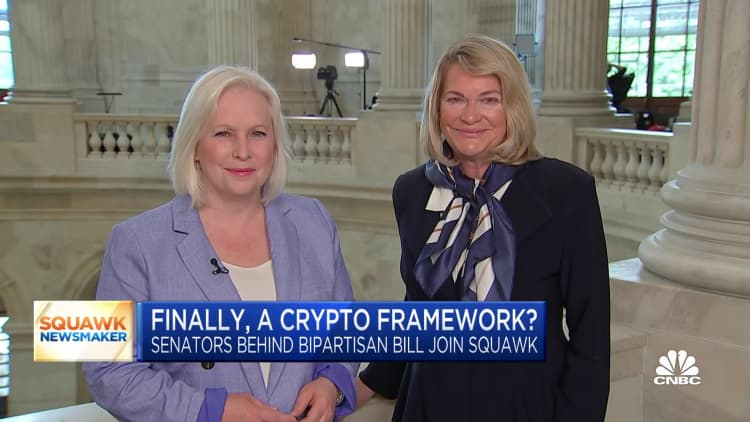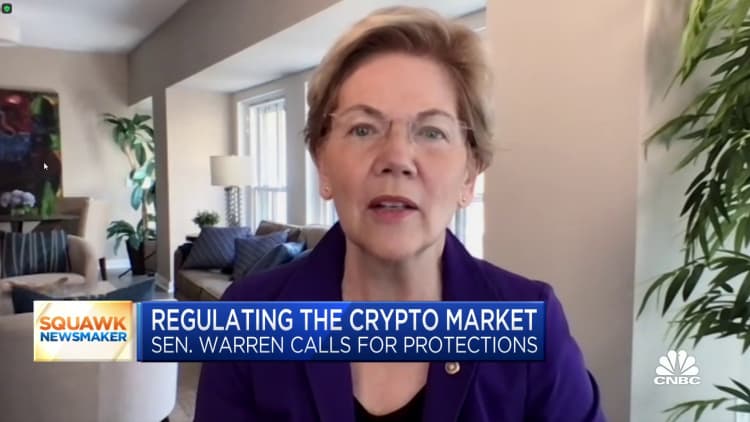Bipartisan crypto regulatory overhaul would treat most digital assets as commodities under CFTC oversight

watch now
Sens. Kirsten Gillibrand and Cynthia Lummis introduced the first major bipartisan legislation aimed at taming the “Wild West” crypto market on Tuesday that would classify digital assets as commodities like wheat or oil and empower the Commodity Futures Trading Commission to rein in the nascent industry.
Gillibrand, a Democrat from New York who sits on the Senate Agriculture Committee, and Lummis, a first-term Republican from Wyoming on the Banking Committee, said the Responsible Financial Innovation Act is the culmination of months of collaboration in the House and Senate and represents a critical first attempt to structure the markets for digital assets with long-awaited legal definitions.
Their offices touted the bill as “landmark bipartisan legislation that will create a complete regulatory framework for digital assets that encourages responsible financial innovation, flexibility, transparency and robust consumer protections while integrating digital assets into existing law.”
The cornerstone of the legislation is how it defines the vast number of digital assets available to American investors and consumers.
With few exceptions, the bill designates digital currencies as “ancillary assets,” or intangible, fungible assets that are offered or sold in tandem with a purchase and sale of a security. Those ancillary assets would be treated like commodities under U.S. law and fall under the jurisdiction of the CFTC.
Aides to Gillibrand and Lummis said their proposed law treats all digitals assets as “ancillary” unless they behave like a security a corporation would issue to investors to build capital.

watch now
Cryptocurrencies and other digital coins won’t be treated like traditional securities under the Securities and Exchange Commission’s scrutiny unless the holder is entitled to the privileges enjoyed by corporate investors like dividends, liquidation rights or a financial interest in the issuer, the aides told reporters.
While staffers described the bill as a mix of input from politicians on both sides of the political aisle, they acknowledged its size and complexity could force lawmakers to break it up and attempt to pass its components piece by piece.
They added that the bill is a product of months of discussion with fellow senators, including Republicans such as Minority Leader Mitch McConnell and Pat Toomey, as well as Democrats like Ron Wyden.
“My home state of Wyoming has gone to great lengths to lead the nation in digital asset regulation, and I want to bring that success to the federal level,” Lummis said in a press release. “As this industry continues to grow, it is critical that Congress carefully crafts legislation that promotes innovation while protecting the consumer against bad actors.”
Gillibrand said their bill will “provide clarity to both industry and regulators, while also maintaining the flexibility to account for the ongoing evolution of the digital assets market,” according to the press release.
The CFTC and SEC together regulate wide swaths of the U.S. markets and act as two powerful Wall Street watchdogs. The former oversees the purchase and sale of raw commodities like corn, coffee, gold and oil, while the latter polices companies, executives and securities that seek to raise capital from the public.
Daniel Kahan, a lawyer in King & Spalding’s cryptocurrency and blockchain group, told CNBC that the legislation is likely a welcome development for investors who believe that the SEC’s rules don’t make much sense for decentralized digital tokens.
“In part, it’s because the securities regulatory regime is so prescriptive,” Kahan, who often represents financial technology companies, said. “There’s a focus on all of these technical elements of the regime around reporting and trading and other things that are not directly tied to fraud.”
The belief is that the CFTC “would be much more appropriate to focus on investor protection and anti-fraud and anti-market-manipulation-type issues rather than on these very technical prescriptive elements of the current securities law regime,” he added.
Aides for both senators touted key features of the bill in a call with reporters, including certain tax exemptions that would shield stablecoin holders from having to report income changes each time they make a purchase with digital currency.
Other new disclosures would inform investors about issuers’ experience developing digital assets, the price history of issuers’ prior assets, anticipated costs, and descriptions of the management teams and liabilities of each issuer.
While it is up to Congress to decide how government agencies police U.S. markets, the SEC and its chairman, Gary Gensler, had for more than a year led the public crusade in support of tighter crypto rules.
“Currently, we just don’t have enough investor protection in crypto finance, issuance, trading, or lending,” Gensler told lawmakers in September. “Frankly, at this time, it’s more like the Wild West or the old world of ‘buyer beware’ that existed before the securities laws were enacted.”

watch now
Representatives for Lummis and Gillibrand said they worked with the SEC on their plan, and spent weeks trying to remedy concerns voiced by the regulator’s attorneys that the legislation would cede too much power. Ultimately, the senators decided it best to grant more authority to the CFTC.
They also said that fees collected from digital asset issuers would play an important role in augmenting the CFTC’s budget to take on what’s expected to be a deluge of regulatory oversight.
Asked for comment, CFTC spokesman Steven Adamske confirmed the commission provided the senators with technical assistance and referred CNBC to a February statement made by CFTC Chairman Rostin Behnam.
“I believe many of the CFTC’s regulatory principles that have made the U.S. derivatives markets the strongest in the world can also serve to aggressively address many of the risks of digital assets,” he said at the time. “The continued emergence of digital asset technology presents risks and opportunities, and the CFTC stands ready to leverage its expertise and experience to confront both.”
The SEC did not respond to CNBC’s requests for comment.
Input from both agencies is critical to the legal debate in the U.S. on how to define cryptocurrencies and other digital assets.
The Gillibrand and Lummis bill, for example, defines a “digital asset” as a natively electronic asset that confers economic or proprietary access rights or powers and includes virtual currency and payment stablecoins.
It later defines virtual currency as a digital asset that is used “primarily” as a medium of exchange, unit of account or a store of value and is not backed by an underlying financial asset.

watch now
The industry has hired more than 200 officials and staff from the White House, Congress, Federal Reserve and political campaigns, according to the Tech Transparency Project. Meanwhile, crypto executives have contributed more than $30 million toward federal candidates and campaigns since the start of the 2020 election cycle, according to Federal Election Commission data.
It’s not surprising to see senators propose relatively light regulation for the crypto industry after investors and executives poured that much into campaigns, said Dennis Kelleher, a co-founder of Better Markets, a prominent financial reform advocacy group.
Kelleher, who served on President Joe Biden’s transition team, said that handing crypto regulation to the CFTC is a deliberate attempt to shove responsibility onto an agency that Congress has left without resources for years.
He said the legislation, in effect, deregulates crypto because the CFTC isn’t equipped to regulate the complex and fast-growing sector. “Actually, in my view, it’s much worse because it’s designed to make the public think it’s regulating crypto,” he said.
“The CFTC is the smallest financial regulator with the smallest budget,” he said. “Wall Street and its allies in Congress have made sure that the CFTC has been chronically underfunded for years, making it impossible for the CFTC to even fulfill its current responsibilities.”
Both Lummis and Gillibrand want to work with their peers to develop their respective states into blockchain and crypto havens.
In the Empire State, New York City Mayor Eric Adams invested his early paychecks in bitcoin and ether, while U.S. Rep. Ritchie Torres, a Democrat representing the Bronx, said in March that his city “should and must embrace crypto if it is to remain the financial capital of the world.”
Wyoming, meanwhile, edited its laws in 2019 to create a novel type of bank charter called a special purpose depository institution to accommodate crypto start-ups and trading platforms and remains on an aggressive track to diversify into finance and away from old-school industries like coal and gas.
Left underregulated by the CFTC, Kelleher said the crypto market could grow into a larger systemic risk.
“Giving the CFTC jurisdiction over crypto is like New York City outsourcing crime fighting to a small-town police force,” he said. “You might see a cop every now and then, but by and large, the criminals are going to be running the place.”











